

Atauro Island, a part of the Democratic Republic of Timor-Leste, boasts a history that is as rich as its natural beauty. Prior to Timor-Leste's independence in 2002, Atauro was a secluded spot with minimal tourism, mainly attracting adventurous travelers and divers interested in its pristine underwater world. The region's tumultuous history, including Portuguese colonization and Indonesian occupation, made access to tourism facilities relatively sparse and left the island largely untouched by mass tourism developments.
In the early 2000s, following independence, Timor-Leste began to emerge as a destination for eco-tourism. Atauro Island, with its vibrant coral reefs, clear waters, and unique biodiversity, became a focal point for this new era. The community-based tourism started playing a significant role in the local economy, with initiatives that emphasized sustainability, cultural preservation, and the empowerment of local communities.
Development of Eco-Tourism
The last decade has witnessed the slow but steady growth of eco-tourism on Atauro. Efforts by NGOs and the Timorese government have sought to develop infrastructure while preserving the island’s natural and cultural heritage. The island has seen improvements in transportation, lodging, and ecotourism activities, like bird watching, trekking, and cultural experiences.
Diving and Snorkeling
Diving and snorkeling have been the backbone of Atauro's tourism sector. The island is known for having some of the most diverse and abundant marine life in the world, with an estimated 642 reef fish species found in its waters. The increased interest in marine conservation and the establishment of marine protected areas have attracted divers from around the globe, turning the island into a world-class diving location.
Community Homestay Programs
Community homestay programs, which allow visitors to stay with local families, have become especially popular. They offer insights into the Timorese way of life and support the local economy directly. Tourists can experience traditional fishing, local cuisine, and the renowned hospitality of the Atauro people.
Current Tourism Trends
Recently, Atauro Island has been tapping into wider tourism trends which focus on off-the-beaten-path experiences and sustainability. There is a greater emphasis on small groups, personalized experiences, and deeper engagement with local cultures.
While the COVID-19 pandemic resulted in a temporary downturn in international arrivals, initiatives for rebuilding and enhancing sustainable tourism are underway. Atauro Island's role in these initiatives is crucial, as it embodies the values of conservation and community-based tourism that are central to Timor-Leste's overall tourism strategy.
To sum up, Atauro Island, with its stunning natural landscapes, warm community, and commitment to eco-friendly practices, continues on a path of developing tourism that benefits both visitors and residents, ensuring the island's treasures remain for generations to come.